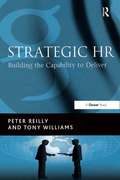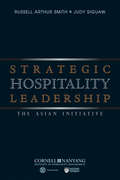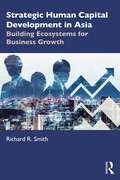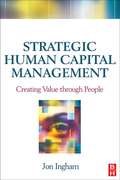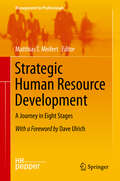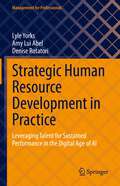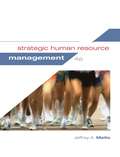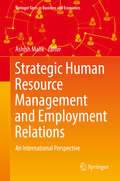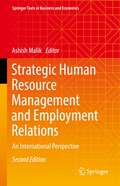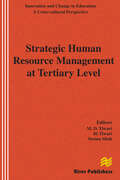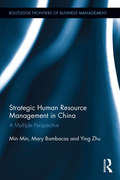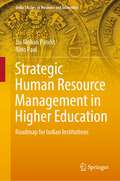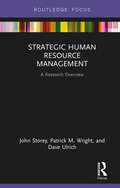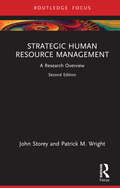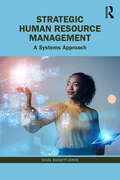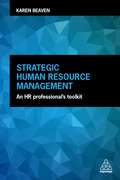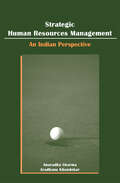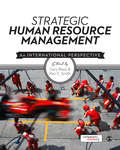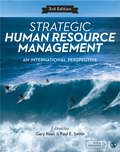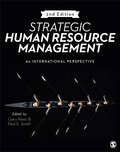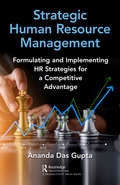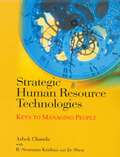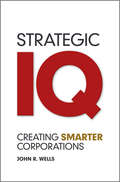- Table View
- List View
Strategic HR: Building the Capability to Deliver
by Tony Williams Peter ReillyHR has sought to reposition itself as a strategic contributor to organizations. To facilitate this, it has restructured, bringing in shared services, business partners and centres of expertise, simplifying, automating and rationalising processes, and devolving some activities to managers, whilst outsourcing others. HR has yet to give sufficient attention to the capability of the function to deliver against the added value promise. This book looks at the developments that have brought HR to its present position. It sets out a vision of where HR might be headed, including a definition of its role and activities. It identifies a number of challenges that HR will have to face if it is to be effective. These include not just skills, but problems with structures and relationships with stakeholders, be they line managers or employees. The authors also highlight ways of monitoring HR performance and of demonstrating its value. It all adds up to an authoritative reference guide for all HR directors seeking to define their role and future aims, for those new to the function on the challenges they will face, and for senior executives on what they should expect the added value to be from their HR function.
Strategic Hospitality Leadership
by Judy Siguaw Russell Arthur SmithDoing business in the tourism and hospitality scene in Asia can be very interesting and rewarding but also poses many challenges.Not many books have been written on the hospitality industry in Asia. Strategic Hospitality Leadership makes a useful contribution, providing the first specialized approach to the business of hospitality in Asia.The book is an invaluable resource of reference and insightful compendium by contributors who are the Cornell School of Administration's alumni, the Cornell-Nanyang Institute of Hospitality Management faculty, and members of its Joint Advisory Board. Their varied backgrounds and profound appreciation of the complexities in building enterprises from the ground up, or expanding an on-going business organization are the types of first-hand knowledge and perspective that is beneficial, informative, and inspirational to industry veterans and students alike. These contributors include chief executives and senior management of hotels and resorts, serviced apartments, restaurants, and food and beverage groups, who have been successful in Asia. Strategic Hospitality Leadership provides readers with the collective wisdom of these successful top executives on a range of topics including brand management, strategic direction, service, marketing, human resource, crisis management, business growth, leadership, portfolio management, best practices, and development. The book will help current and future leaders address major issues that are being and will continue to be confronted in the hospitality industry in Asia, and aims to increase the success of new entrants into Asia.
Strategic Human Capital Development in Asia: Building Ecosystems for Business Growth
by Richard R. SmithAsia continues to ascend as an economic powerhouse and a strategic priority for business leaders around the world, yet there is often limited understanding of the human capital systems that fuel the economic engines of the region. This book brings together the perspectives from economics, sociology, and management to highlight the business implications of human capital development in Asia. This book provides new insights on human capital systems in Asia by considering the country context through a 'Human Capital Ecosystem' framework. Applying this framework, constituent outline, and comparable points across each of the countries in Asia, Smith translates national policies into insights on the drivers, challenges, and opportunities in individual countries. Each chapter also draws out clear business and HR implications based on the above framework and analysis. While Asia continues to be a critical priority for businesses, there is limited understanding on how to manage and navigate the human capital systems in each of the region’s diverse countries. This book will serve as a helpful reference for managers or supplemental study guide for graduate students working to understand how to execute business strategy in major economies of Asia.
Strategic Human Capital Management
by Jon InghamStrategic human capital management (HCM) is not just a measurement focused approach to human resource management (HRM). It is certainly not a decision science in which people can be managed as a result of quantitative analysis and financial valuation. In fact, it is probably more of an art than a science and is a way of leading people to unlock great business performance. Strategic HCM focuses all people management and development practices on maximizing the capability and engagement of the people working for an organization to create valuable intangible capability, human capital, which enables the organisation to take full advantage of potential business opportunities. Unlike HRM which focuses on getting closer and closer to the business, strategic HCM draws its energy from people, from their individual strengths, interests and motivations, which, aligned with long-term business strategy, can increasingly provide the main basis for differentiation and competitive advantage. However, the perspective also recognizes that measurement is important, and the book outlines an approach to measurement which recognizes the importance of knowledge, complexity, best fit and intangibility. Pulling together seemingly disparate strands of thinking, the book calls for a paradigm change in which people really are seen as an organisation’s most important asset, and are managed in a way that reflects this fact. The text includes case studies from leading private and public sector organizations and commentary from HR practitioners and academics.
Strategic Human Resource Development
by Matthias T. MeifertIn an era that has brought new and unexpected challenges for virtually every company, one would be hard-pressed to find any responsible manager who is not thinking about what the future will bring. In the wake of these challenges, strategic planning has moved from being the reserve of large corporations to becoming an essential need for even small and medium-sized enterprises. But what good is even the most convincing strategic concept if the company's people are unwilling or unable to put it into practice? The key is to develop people, and to develop them not only for the work of today, but also for the challenges that the future holds. Strategic HR development has become a decisive force for the success of any business. This book, edited by Matthias T. Meifert, shows us which basic considerations we need to remember and what strategic HR development means in practice. Its interesting and vivid approach takes the reader on a tour of the eight stages of HR development, introduces the critical factors, and highlights many practical recommendations for strategic HR development practice in business.
Strategic Human Resource Development in Practice: Leveraging Talent for Sustained Performance in the Digital Age of AI (Management for Professionals)
by Lyle Yorks Amy Lui Abel Denise RotatoriThis book examines human resource development (HRD) strategy as a learning process, connecting learning and adult development with organizational development and change, and talent development, with a particular focus on the use of artificial intelligence (AI). It provides professionals and practitioners as well as students with processes and tools that will help them meet the needs of employees and the organization. It takes a scholar-practitioner perspective connecting theory with practice. HRD has evolved into a mature field of scholarship in recent decades. At the same time, practices of learning and development in organizations continues to evolve dramatically. At the individual, developmental, and organizational levels, workers, managers, and executives have to be continually learning from current and emerging trends in order to strategically reposition themselves for performance and future possibilities. This includes developing the competencies to navigate the complexities of a world in which people are interacting with ‘smart’ digital technologies that are broadly grouped together under the umbrella term artificial intelligence (AI). Featuring specific strategic learning methods and case studies from senior HRD professionals, this book is a valuable resource for managers, practitioners, students, scholars and others interested in strategic HRD practice.
Strategic Human Resource Management
by Jeffrey MelloMake human resources work for you. STRATEGIC HUMAN RESOURCE MANAGEMENT shows you how through its unique system of concept integration. Most human resources textbooks give you the theories without showing you the connections to real life. This textbook lets you see both sides of human resources: the theory and the application. That way, you will not only get a great grade in class, you will be on your way to success after college as well.
Strategic Human Resource Management and Employment Relations: An International Perspective (Springer Texts in Business and Economics)
by Ashish MalikThis book analyses a collection of key strategic human resource management (HRM) and employment relations (ER) topics. The book follows a unique pedagogical design employing problem-based learning and participant-centred learning approaches, both of which the author has extensive experience in implementing with post-graduate learners. The book also prepares the learner to use these approaches, and has resources for the instructor.The first part of the book provides a very focussed research commentary highlighting the key theoretical approaches in HRM and ER. The second part offers details of the design and implementation of strategic HRM and ER practices. The third part features a selection of contemporary research-based case studies that bring to life the debates and tensions inherent in the field of strategic HRM and ER.
Strategic Human Resource Management and Employment Relations: An International Perspective (Springer Texts in Business and Economics)
by Ashish MalikThis textbook takes a theoretically informed and practice-based approach to strategic human resource management (HRM) and employment relations (ER). The book follows a unique pedagogical design employing problem-based learning and participant-centred learning approaches, both of which the author has extensive experience in implementing with advanced undergraduate HRM and post-graduate learners.This new edition includes chapters on artificial intelligence (AI) and HR, employee experience and engagement, managing HRM during crises, and eight new cases. In addition, this book includes an online instructors’ manual for instructors.
Strategic Human Resource Management at Tertiary Level (River Publishers Series In Innovation And Change In Education Ser.)
by M. D. Tiwari Iti Tiwari Seema ShahIn this book, we focus on HRM and how modern technology is helping in ensuring the effectiveness of HR functions. This would indicate that HRIS was viewed rather favorably as an administrative tool, but not a strategic one. This volume covers all these aspects.
Strategic Human Resource Management in China: A Multiple Perspective (Routledge Frontiers of Business Management)
by Ying Zhu Min Min Mary BambacasThis book documents and explains how strategic human resource management (SHRM) and high performance work systems (HPWS) have been adopted among indigenous enterprises, namely state-owned enterprises (SOEs) and domestic private enterprises (DPEs) in China, from both management and employee perspectives. The book examines the mutual relationships between employees and their supervisors/ managers through social exchange theory. It explains how and why employees develop their perceptions and relationships with their immediate supervisors/managers in the working environment and the consequent effects on their attitudes and behaviour at work. Given the importance of the Chinese economy in the world, and the impact of its ‘open door’ policy and economic and management reforms, this book will provide valuable insight into China’s SHRM and HPWS.
Strategic Human Resource Management in Higher Education: Roadmap for Indian Institutions (India Studies in Business and Economics)
by Jai Mohan Pandit Bino PaulThis book explores the practices and policies of human resource management (HRM) in higher education institutions (HEI), while also analyzing the governance and structural challenges. It explains the assessment of university as an organization, outlining the distinction between universities and firms from an HRM point of view by analysing various objectives, parameters and outcomes. The book broadly probes the relevance of HRM systems in HEIs in India and their potential impact. It also examines whether existing HRM practices and policies in HEIs in India drive motivation and enable employees to perform their functions to achieve the highest possible levels of excellence. It explores whether the enhanced motivation of employees consistently impacts students, their placements, progress to higher education, and quality teaching and research output. To strengthen the research output, to better understand the functioning of HRM practices in foreign HEIs and for comparative reasons, the book also studies HEIs in the United States against a diverse set of HEIs in India. It concludes by highlighting the impact of India’s National Education Policy 2020 and its scope to transform and professionalise the higher education system in the country. The book is indispensable for researchers in education management and policy studies and those in governing positions in higher education institutions. It is also a valuable resource for regulatory and government bodies, and policy-formulating think tanks in South Asia which have a similar education system as India.
Strategic Human Resource Management: A Research Overview (State of the Art in Business Research)
by John Storey Dave Ulrich Patrick M. WrightThe field of Strategic Human Resource Management (SHRM) has burgeoned over the past thirty years. Over this time there has been a shift towards a strategic conception which posited workers as ‘assets’ rather than ‘costs’. These ‘human resources’ were reconceptualised as a key source of competitive advantage. As such, these assets were to be treated seriously: selected with care, trained and developed, and above all, induced to offer commitment. The concept of ‘human capital’ came to the fore, and in the decades following these developments, research output has been voluminous. Strategic Human Resource Management: A Research Overview, authored by global research leaders, provides an expert summary of this crucial element of organizational performance. This new shortform book develops the argument that one of the crucial elements of organizational performance is the way work is organized in skill and talent packages both within an organization’s boundary and across global competency clusters. Secondly, it focuses on current and emergent challenges. The ‘package’ of HR approaches has changed over time and patterns can be observed. This new volume pays special regard to the HR implications arising from radically altering contexts – economic, social, and technological. This concise volume covers crucial themes of lasting interest, and as such is essential reading for business scholars and professionals.
Strategic Human Resource Management: A Research Overview (State of the Art in Business Research)
by John Storey Patrick M. WrightThe second edition of this popular shortform book provides a concise expert summary of key issues in the theory and practice of the management of human resources (HR) – one of the most crucial drivers of organizational performance. As human resource management strategies evolve over time, this new edition pays special regard to the HR challenges arising from radically altering contexts – economic, social, and technological. For example, the book examines research reports on the impact of the COVID pandemic and other disruptions to the global world of work. It assesses recent HR initiatives and priorities such as Equality, Diversity and Inclusion (EDI) and the HR implications of remote and hybrid working. The book evaluates contemporary critiques that HR practice and research can be part of the problem. In sum, the book offers a route map through the extensive terrain of contemporary research project findings. Serving as a unique researcher’s guide, this concise book enables readers to develop their own ideas for future research and such is essential reading for management scholars and reflective practitioners.
Strategic Human Resource Management: A Systems Approach
by Nigel Bassett-JonesThis innovative text applies a systems theory perspective to strategic human resource management, drawing particularly on the Viable System Model and soft systems methodology. Readers are introduced to different ways of thinking about systems and shown how systems can interact, triggering changes in the competitive environment – and how HR systems can either facilitate or inhibit adaptation to these changes. Peppered with international examples throughout, this book considers key HR topics such as recruitment, reward, employment relations, culture, diversity and leadership, all through a systems lens. It shows how an understanding of system dynamics can help managers to recognise complexity, accept the inevitability of short-term systemic conflicts and anticipate the likely consequences. This text will be suitable for upper-level undergraduate, postgraduate and MBA students of strategic HRM, HRM and strategic management. It will also be thought-provoking for HR professionals looking to embrace a strategic role in their organizations.
Strategic Human Resource Management: An HR Professional's Toolkit
by Karen BeavenHR's contribution to the business goes beyond its traditional role of managing hiring, discipline and payroll. Strategic Human Resource Management is a practical guide for all those in HR roles to support wider organizational goals and objectives whilst developing and engaging individual employees through focussing on the concept of 'People Experience'. Drawing upon tools, exercises and case studies, this complete resource covers the core areas that are essential to achieving competitive advantage through understanding yourself, your business, your industry and your profession.Strategic Human Resource Management shows how to hone the personal skills needed to excel in HR and leadership positions, such as authenticity, network building and managing stakeholder relationships, alongside the importance of focussing on self-care and mental wellbeing. It provides guidance on building competitor awareness, markets and channels, trends and forecasting and interpreting financial results in order to build commercial acumen. Career frameworks, professional accreditation and the importance of continued personal and professional development are also explored, in addition to technological trends and the future of work in a changing business environment. This comprehensive toolkit is an indispensable resource for HR professionals who want to implement HR practices that benefit the business and its workforce, and make an impact within their organization and profession.
Strategic Human Resource Management: An Indian Perspective
by Anuradha Sharma Aradhana KhandekarBusiness organizations the world over are increasingly recognizing the potential of their human resources. Strategic human resource management emerged out of the parent discipline of human resource management emerged out of the parent discipline of human resource management with the aim of optimizing organization objectives. It emphasizes the strategic importance of formulating HR objectives. It emphasizes the strategic importance of formulating HR objectives, strategies, and policies with a view to developing the skills and abilities for the achievement of competitive advantage. This book provides a comprehensive, contemporary, and critical review of the key issues in strategic human resource management in India. The focus is on the reality of "people management" in large, global companies. Establishing the effectiveness of strategic HRM with respect to organizational performance, the authors examine recent research as also provide case studies of companies operating in the country.
Strategic Human Resource Management: An International Perspective
by Paul Smith Gary ReesContaining simple explanations of complex ideas and written in plain English, this text has been designed with your needs as a student firmly in mind. Whether you are studying at undergraduate or postgraduate level, our team of expert authors will guide and develop your understanding of each key area of the curriculum, from the fundamentals through to critical evaluation towards the end of each chapter. <P><P> Key features:<P> * Numerous practical examples and case studies in each chapter bring the rigorous theoretical and academic underpinning alive <P> * Cases and examples from across the globe as well as chapters on culture and globalization reflect the global nature of the contemporary workplace <P> * Final chapter on the future of HRM by Linda Holbeche, former director of research at the CIPD, will equip you to deal with new and emerging issues and challenges <P> * Excellent range of learning features including an end of book glossary to help you quickly understand new and complex terminologies <P> * Visit the companion website at: http://www.sagepub.co.uk/rees <P> Full-text SAGE journal articles available online to encourage further exploration of the field and filmed introductions to each area by the book's team of experts.
Strategic Human Resource Management: An International Perspective
by Gary Rees Paul E. SmithWhether you are studying at undergraduate or postgraduate level, our stellar team of expert authors will guide you through the key topics of human resource management from strategic and international perspectives. Starting with the fundamentals of each topic and progressing through to critical evaluation, the 3rd edition includes: Even more international case studies from across Europe, Asia, Australia and the Middle East – which bring the theory and academic underpinning to life A wide range of Reflective Activities that encourage you to consider the real-world implications of what you have learnt An updated companion website featuring a wealth of resources for lecturers and students, including an Instructor’s Manual, PowerPoint slides, a Testbank, recommended journal articles and additional business cases
Strategic Human Resource Management: An International Perspective
by Gary Rees Paul E. SmithWhether you are studying at undergraduate or postgraduate level, our stellar team of expert authors will guide you through the key topics of human resource management from strategic and international perspectives. Starting with the fundamentals of each topic and progressing through to critical evaluation, the 3rd edition includes: Even more international case studies from across Europe, Asia, Australia and the Middle East – which bring the theory and academic underpinning to life A wide range of Reflective Activities that encourage you to consider the real-world implications of what you have learnt An updated companion website featuring a wealth of resources for lecturers and students, including an Instructor’s Manual, PowerPoint slides, a Testbank, recommended journal articles and additional business cases
Strategic Human Resource Management: An international perspective
by Gary Rees Paul E SmithA research-focused introductory text written by a stellar contributor line-up including Linda Holbeche, Stephen Taylor and Jim Stewart. The Second Edition integrates an international perspective using examples and case studies from a broad range of regions and industries including Microsoft, Volkswagen and Rolls-Royce. The 2 new chapters on Culture and Globalisation reflect the contemporary workplace, and the future of HR based on Linda Holbeche’s latest research is included in the final chapter. The book is complemented by a companion website featuring a range of tools and resources for lecturers and students, including PowerPoint slides, Testbank, an Instructor’s manual, access to SAGE Journal articles and author podcasts. Suitable for upper undergraduate and Masters level strategic HRM modules or HRM modules that have a strategic angle.
Strategic Human Resource Management: An international perspective
by Gary Rees Paul E SmithA research-focused introductory text written by a stellar contributor line-up including Linda Holbeche, Stephen Taylor and Jim Stewart. The Second Edition integrates an international perspective using examples and case studies from a broad range of regions and industries including Microsoft, Volkswagen and Rolls-Royce. The 2 new chapters on Culture and Globalisation reflect the contemporary workplace, and the future of HR based on Linda Holbeche’s latest research is included in the final chapter. The book is complemented by a companion website featuring a range of tools and resources for lecturers and students, including PowerPoint slides, Testbank, an Instructor’s manual, access to SAGE Journal articles and author podcasts. Suitable for upper undergraduate and Masters level strategic HRM modules or HRM modules that have a strategic angle.
Strategic Human Resource Management: Formulating and Implementing HR Strategies for a Competitive Advantage
by Ananda Das GuptaThe concept of strategic human resource management has developed widely in the last couple of years, especially because of the impact of human resources on the competitiveness of organizations. The development of human resource strategies involves taking into account their multiple mutual dependencies and the fact that they must be vertically integrated with the business strategy. These strategies define the intentions and plans related to the overall organizational considerations, such as organizational competitiveness, effectiveness or image, and to more specific aspects of human resources management, such as resourcing, motivating, valuating, learning and development, reward and employee relations. Strategic management of human resources provides a large perspective on the way critical issues or success factors related to people can be addressed and how different concepts of strategic decisions are made, with long-term impacts on the behavior and success of the organization. The fundamental objective of human resource strategic management is to generate strategic capabilities by ensuring that the organization has the high-qualified, committed and well-motivated employees it needs to achieve and sustain the competitive advantage. The emergence of strategic human resource management (SHRM) is influenced by global competition and the corresponding search for sources of a sustainable competitive advantage. SHRM has achieved its prominence because it provides a means by which business firms can enhance the competitiveness and promote managerial efficiency. It facilitates the development of human capital that meets the requirements of a competitive business strategy, so that organizational goals and the mission of the organization will be achieved. The HRM system is defined as "a set of distinct but interrelated activities, functions and processes that are directed at attracting, developing, and maintaining (or disposing of) a firm’s human resources." Many agree that HRM is the most effective tool which contributes to the creation of human capital, and in turn, contributes to organizational performance and the competitive advantage. This book puts emphasis on understanding the role of HRM between organizations and people and provides an analytical approach toward encompassing HRM, employment relations, and organizational behavior. As a management discipline, HRM draws insights, models and theories from cognate disciplines and applies them to real-world settings. Further, this book discusses how current theoretical perspectives and frameworks (e.g., those related to strategic competitiveness, knowledge management, learning organization, communities of practice, etc.) can be applied by reflective practitioners to create an eco-friendly organizational culture.
Strategic Human Resource Technologies: Keys to Managing People (Response Books)
by Jie Shen Ashok Chanda B Sivarama KrishnaIn recent years, technology has transformed human resource management (HRM). While the task of managing people in organizations is becoming ever more complex, HR professionals can now get better results with the help of new tools and techniques. This pioneering and unusual book defines HR techniques as technologies in their own right, and consolidates a broad array of strategies to provide a holistic view of people management. Bringing together 40 strategic HR technologies and explaining where and how they can add value to an organization, the authors also discuss how to brand these technologies within the enterprise. They cover the four broad areas of HR management: - Human technologies for profit-making - Building individuals and teams - Attracting and retaining talent - Scenario-building for the future Using models, charts and clearly-defined terminology, this book lays out the theories and practical steps in the application of HR technologies.
Strategic IQ
by John WellsIn today's world, only the smartest survive. The competitive landscape is littered with graves of well-known firms whose revenues, profits and stock prices rose for decades until they suddenly imploded. In fast-changing business environments, firms must adapt their strategies and innovate to remain at the top. But many successful firms fail to do so. Instead, they succumb to inertia, hesitate, or stick blindly to their old strategies, until it is too late. The ability to adapt to change is a measure of intelligence; so why do firms demonstrate such low Strategic IQ? What causes inertia and why is it so deadly? How can leaders help their firms to act more intelligently?This book identifies the key sources of inertia - strategic, structural and huma - and provides practical advice on how they can be overcome to create smarter corporations. It is both a wake-up call for successful firms and a lifeline for firms struggling to succeed. To successful firms - beware! You may already be dead! To struggling firms - have hope! It is possible to pass powerful competitors by raising your strategic, structural and human IQ. Praise for Strategic IQ"Hard-hitting and stimulating, Wells' thesis carries a robust message that should make business leaders the world over sit up and think." Archie Norman, Chairman of ITV, UK "Wells makes a compelling case for dramatic change." Ron Sargent, CEO of Staples, USA
